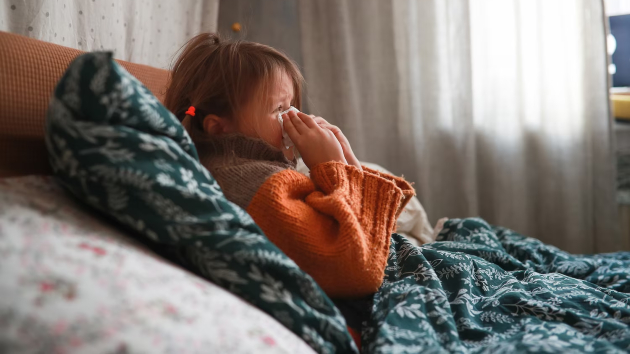Papua New Guinea landslide raises risk of disease outbreaks, mental health impacts
Written by ABC Audio ALL RIGHTS RESERVED on May 29, 2024
(PORT MORESBY, PAPUA NEW GUINEA) — Outbreaks of disease could emerge following the devastating landslide that occurred in Papua New Guinea, according to experts.
A mountainside collapse early Friday buried villages in the Enga province, located in the northern region, under rock, soil and rubble — wiping out homes, schools and businesses, local authorities said.
About 670 people are confirmed dead while the country’s National Disaster Center believes the true death toll could be as high as 2,000 with hundreds of bodies trapped under debris.
Population health and infectious disease experts told ABC News that, after a landslide, standing water, lack of access to medical care and improper sanitation can lead to disease outbreaks. Additionally, mental health can be severely impacted with symptoms lasting for several years after the event.
Infectious diseases are easily spread
“In the aftermath of a disaster … usually in the first couple of days, you’re really dealing with injuries, the trauma of getting hit by the debris, and those types of injuries,” Jeffrey Schlegelmilch, director of the National Center for Disaster Preparedness at Columbia Climate School at Columbia University, told ABC News. “So, it’s more of a trauma-focused response. Then, days and weeks out, comes the emergence of the infectious disease.”
Landslides often lead to large areas of pooling, standing water and disrupt an area’s infrastructure, resulting in a lack of a clean water supply or proper sanitation.
People may be drinking untreated drinking water or sewage-contaminated water, causing gastrointestinal illnesses, such as cholera. Meanwhile, standing water can attract mosquitoes and lead to mosquito-borne illnesses, such as malaria.
Dr. Nathaniel Hupert, an associate professor of population health sciences and of medicine at Weill Cornell Medicine in New York City, said the risk of malaria is important because Papua New Guinea has had a resurgence in malaria over the last 10 to 15 years for reasons that are not quite well understood.
In 2020, Papua New Guinea had more than 750,000 reported cases of malaria, the most of any country in the Asia-Pacific region.
“It turns out that, unlike earthquakes, which typically are not associated directly with increases in malaria, landslides that occur in countries that have high malaria rates seem to be associated with big outbreaks of malaria,” he told ABC News. “And this seems to be due to both the fact that the landslides clear away forests and also create spaces for pooling of water, which the mosquitoes that carry the malaria just love. … So, one of the things that we can probably predict in the aftermath of this really large landslide is that malaria rates are going to go up.”
Additionally, respiratory diseases — such as the common cold, the flu and even COVID — can also emerge as people take shelter in congregated settings, where such infections are easily spread.
Dr. Amesh Adalja, an infectious disease physician and senior scholar at Johns Hopkins Center for Health Security in Baltimore, Maryland, told ABC News because Papua New Guinea is in the southern hemisphere, it is currently entering its flu season, so medical workers will need to be on the lookout for rising cases.
“Some of the key things are going to be making sure people are vaccinated, are getting vaccinations,” he said. “But in many cases, vaccinations are going to take some time to kick in. So, it’s really going to be about hygiene, so that might mean wearing masks in congregated indoor settings, increasing ventilation in those types of indoor settings — if they’re able to, for example, open windows, keeping the air circulating.”
Indirect effects on those with chronic diseases
While many people will likely fall severely ill from illnesses related directly to the landslide, experts say there may be indirect consequences as well.
Patients suffering from underlying conditions, such as heart disease, diabetes or high blood pressure, may not have access to their doctor or a health care provider — or hospitals may be offline — due to the landslide.
Additionally, patients may not be able to access their medications, which could result in a worsening of their conditions.
Studies have shown that various natural disasters can worsen chronic conditions and fail to meet pharmaceutical needs. A study of evacuees relocated to San Antonio, Texas, after Hurricane Katrina in 2005 found medical relief pharmacy supplies did not meet the demands of evacuees.
“Anytime there is a severe disruption in the infrastructure of a country, such as what happens during a landslide, there’s going to be disruptions in the general medical care in a given area,” Adalja said. “The whole healthcare system can get disrupted anytime there’s a major impact like this and that’s going to be something that exacerbates all the other medical conditions that are not directly related to the landslide but are what’s present in the population to begin with.”
He said it will be important for aid workers and medical staff to try to fill in the gaps in medical care left by the landslide so people can keep track of their chronic conditions and that undiagnosed chronic conditions may be detected.
During a major event, such as a landslide, “people think about the acute things, but the chronic things can add up and can present a severe burden to the health care system in a place like Papua New Guinea,” Adalja said.
Mental health impacts
While the physical health impacts of a landslide can be devastating, the mental health impacts can also be severe and long-lasting.
A 2001 study looking at the impacts of the 1998 landslide in the Sarno area of southern Italy found that survivors were 20 times more likely to have post-traumatic stress disorder (PTSD) than members of a control group.
One year after the disaster, 90% of survivors in the study had criterion B symptoms of PTSD, which are characterized by unwanted, upsetting memories; nightmares; flashbacks; and emotional or physical reactions after experiencing traumatic reminders.
A 2022 study looking at survivors of the 2010 landslide in Bududa, in eastern Uganda, found that nearly half of participants had PTSD symptoms.
“With this landslide, it’s not just going to be the immediate loss of life or the displacement, but the recovery,” Hupert said. “So, emergency mental health is really critically important, but establishing and integrating into existing primary care the type of mental health support that may be needed is really going to be the thing that — is difficult to achieve — but would be most important in terms of long-term funding and planning. And those effects greatly outlive, in many cases, the immediate infectious disease impacts.”
Schlegelmilch explained that the mental health of landslide survivors often progresses a non-linear fashion and isn’t always a steady progression up or a regression down.
He added that, in addition to providing mental health counseling or medication when needed, providing help for survivors to balance their daily routines can be beneficial.
Schlegelmilch said he visited a shelter during one of his many trips to natural disaster areas in the U.S. where mental health workers told him the creation of a child-friendly space can boost the mental health of both children and adults.
“I think that we can’t underestimate the ability to sort of have a sense of normalcy and create a sense of normalcy for folks,” he added.
Copyright © 2024, ABC Audio. All rights reserved.







